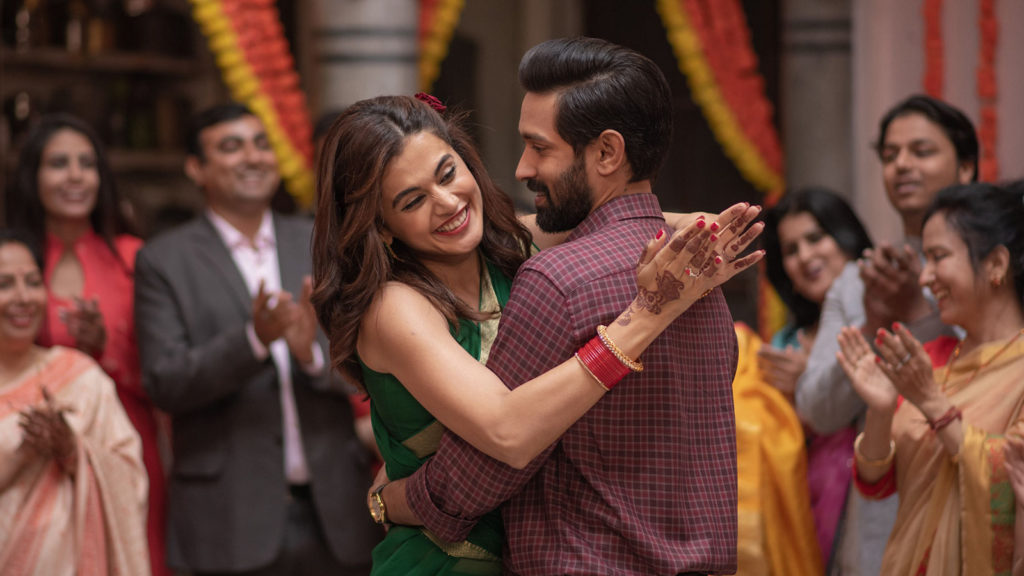I was randomly scouring through Netflix when I came across a trailer with Aditya Srivastava wearing a police uniform. It instantly took me back to the CID days. That’s when I decided that I’ll be watching Haseen Dillruba the moment that it is released.
I stuck to my word, and I clicked the “featured” banner on the due date. Despite the representation of the abusive relationship in the movie, I felt like the movie had more to offer. It had components that mostly went unnoticed by critics. This movie should have been judged based on whether or not it truly met the intentions of director Vinil Mathew. Although I won’t concede to public hate, I, however, cannot call it the perfect representation either.
The movie begins with an explosion in the small town of Jwalapur. Inspector Kishore Rawat (Srivastava) is seen questioning our antihero Rani’s (Tapsee Pannu) character as a desperate attempt at milking a confession out of her. Rani is under suspicion of murdering her husband. Inspector Rawat questions her character over and over again, but Rani doesn’t budge. The next scene shows Rani before her marriage with Rishu (Vikrant Massey) in her ravishing outfit ordering the man around and taking the first attempt at conversation. She eventually ends up marrying into his traditional Hindu family. She revolts against the mother-in-law’s expectations from the housewife.
While it would seem that writer Kanika Dhillon is aiming at portraying a strong woman breaking free from gender norms, the story immediately points in the opposite direction. Like every traditional housewife, Rani learns the ways of the “perfect pink” in order to seduce her man, because apparently, that is her agency now. She learns how to cook and how to dress properly, like every other newly-wed woman in a backward society. It feels hurtful to watch, but it still isn’t enough for one to dismiss the Bollywood piece. This is because, the key plot of the film, the “whodunit” is just beginning. Like every successful crime novel, the writer will make you overlook the problematic narratives of the setup of the movie and keep making you ask what happens.
The plot takes off as Rishu’s adventurous cousin Neel (Harshavardhan Rane) pays them a visit. Rani starts down a path of lust-induced escapade. Her private life does not remain as private as she would have preferred. Neel moves on, but the idealistic family life that Rishu and Rani were aiming at is destroyed. Rani sees only one way out. She teams up with her lover and kills her husband.
Or does she?

As for the framing and unveiling of the mystery, Dhillon does a decent job. It’s nothing out of the ordinary. A slightly twisted crime of passion. As for the characters, I feel like the movie gives them a lot of unnecessary depth. Rishu, for example, is a simpleton, a nerd, and an engineer. He is timid and feeble.
When Dhillon tries to portray his anger by making him try to kill his wife, it almost feels far-fetched.
Furthermore, the movie endorses the idea of physically abusing the woman in the relationship. I could let it slide if the narrative was brought in to portray the actual picture of the society. Sadly, the writer fails at that too.
Neel turns out to be a typical bad-boy and a ladies-man. His eventually turning out to be a sexual harasser does not hit as a surprise. However, the character of Inspector Rawat is one that needs criticism. Although he plays an important component in the story, his lines are limited. He is only shown in the movie as an afterthought and it feels like a shame when you realize that the most screen-time Detective Abhijeet got was in the trailer. The trailer can be deemed misleading.
Finally, the character of the lead actress, Rani, is complex. It is, perhaps, a bit too complex, not because it got abstruse, but because it got stupid. In the beginning, she was fierce, then she was sassy, then she was wild, then she was hurt and, in the end, I don’t even know what she was. She committed a crime. Perhaps the perplexity of the message gave the movie a little more meaning. I’m not sure this is the meaning we were looking for, but it’s the one we got. It however felt good seeing Tapsee Pannu take on a role unlike the ones she’s used to.
To finish off, I believe questioning the morality of the narrative would not be the case, had the movie come out some two or three years earlier. Perhaps the normalization of abusive relationships in media is problematic. However, I did not feel like the intentions of Mathew were to normalize an idea. I rather felt like he tried to give us a picture of a tiny backward town at a corner of India. We could debate about how successful he was in that regard. I liked the cinematography; it completely captured the lives that are supported by the Bhairab. Overall, I felt this is not the best thriller out there, but it was not worth being dismissed either. Good for a recreational watch.